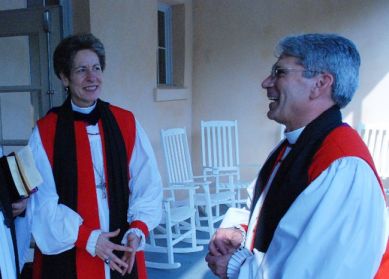Episcopal Church Majority 'Beyond' Conflict, Minority Bishop Mulls Options

The top bishop in the Episcopal Church declared in a letter to parishes that the denomination is 'beyond' entrenched conflicts on hot-button issues, including temporary rites for same-sex blessings, although one diocesan bishop recently stated that he believes the Church has crossed a line he cannot do so personally.
Presiding Bishop Katharine Jefferts Schori acknowledged divided opinion but said the General Convention in July made decisions that minimized potential offense to opposing parties, stating that the denomination had "moved beyond entrenched conflict of recent years."
"The hot-button issues of the last decade have not been eternally resolved, but we have as a body found creative and pastoral ways to live with the differences of opinion, rather than resorting to old patterns of conflict," she wrote.
Rev. Schori, who addressed various issues, led first with the approval of a trial blessing rite for same-sex relationships.
"Some of the responses by bishops with questions about the appropriateness of such rites in their dioceses show creativity and enormous pastoral respect for those who support such blessings," she said.
"The use of this rite is open to local option, in the same way we often think about private confession: 'all may, some should, none must,'" she wrote.
Opposing Bishop Mulls 'Path Forward'
Both of the Church's legislative chambers passed – with overwhelming majorities - resolutions authorizing the use of the rite and a separate resolution allowing for full inclusion of transgender people in the life of the church.
Some of the minority made their opposition known at the Convention in Indianapolis in early July, with several members of the South Carolina delegation choosing to leave early, including Diocesan Bishop Mark Lawrence who called the resolutions "disconcerting changes to doctrine."
On July 25, Rev. Lawrence met with clergy of the diocese reiterating the stance he took at the Convention, noting he told bishops gathered that he "could no longer in good conscience continue in the business of the Convention," according to a letter to clergy released by the diocese recently.
"In fact, he was left with the grave question of whether he could continue as a bishop of an institution that had adopted such changes," the letter stated. "It was with that question on the table that he took his leave from the House of Bishops."
Since that time, Bishop Lawrence has stated "he believes the Episcopal Church has crossed a line he cannot personally cross," according to the letter.
Rev. Lawrence asked for "period of grace" until he returns from several weeks of vacation in late August to meet with the Standing Committee and the clergy of the diocese to express a "path forward."
Church's 'Creative Responses'
Rev. Schori remarked on "creative responses" to other issues including peacemaking in Israel Palestine, the Anglican Covenant, and the call to restructure The Episcopal Church."
The General Convention also called for the creation of the church's theology of marriage, noting the Anglican province of Aotearoa, New Zealand and Polynesia have done the same.
"This may offer some very creative opportunities for study across provincial boundaries in the Anglican Communion," she wrote.
She said Convention delegates' resolutions "reflect a higher level of investment in the health of diverse opinions and positions in the Church than we have seen for a long time."
Rev. Schori also says that the church has "widely" realized "that the way we've 'done church' for the last century or more no longer fits many of our contexts," she worte.
She referred to the need for changes in the way the church deals with evangelism, retaining children and changing family structures - a reference to women in the workforce, single-parent families, or special needs children. A task force will be appointed to make proposals by 2014.